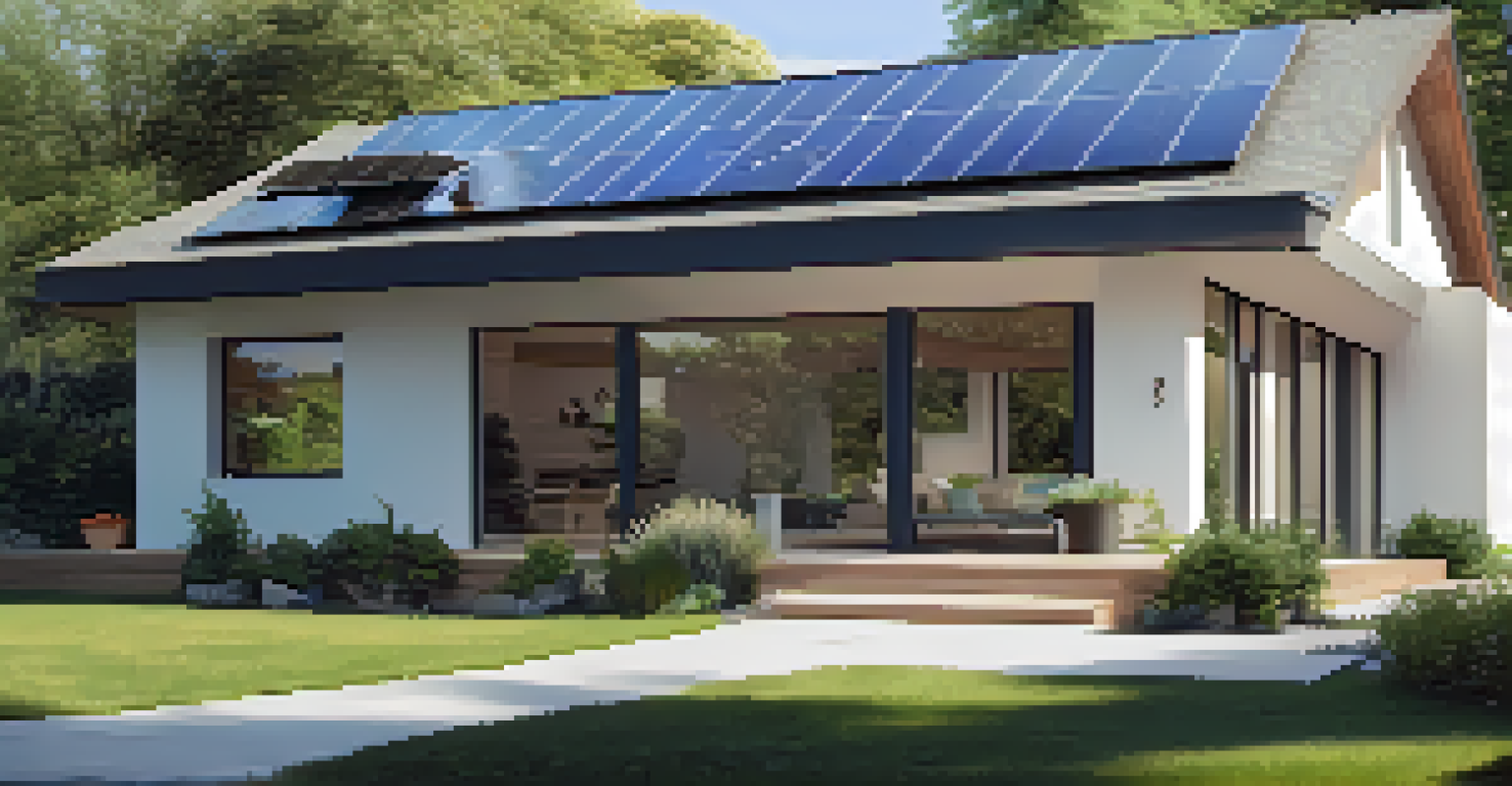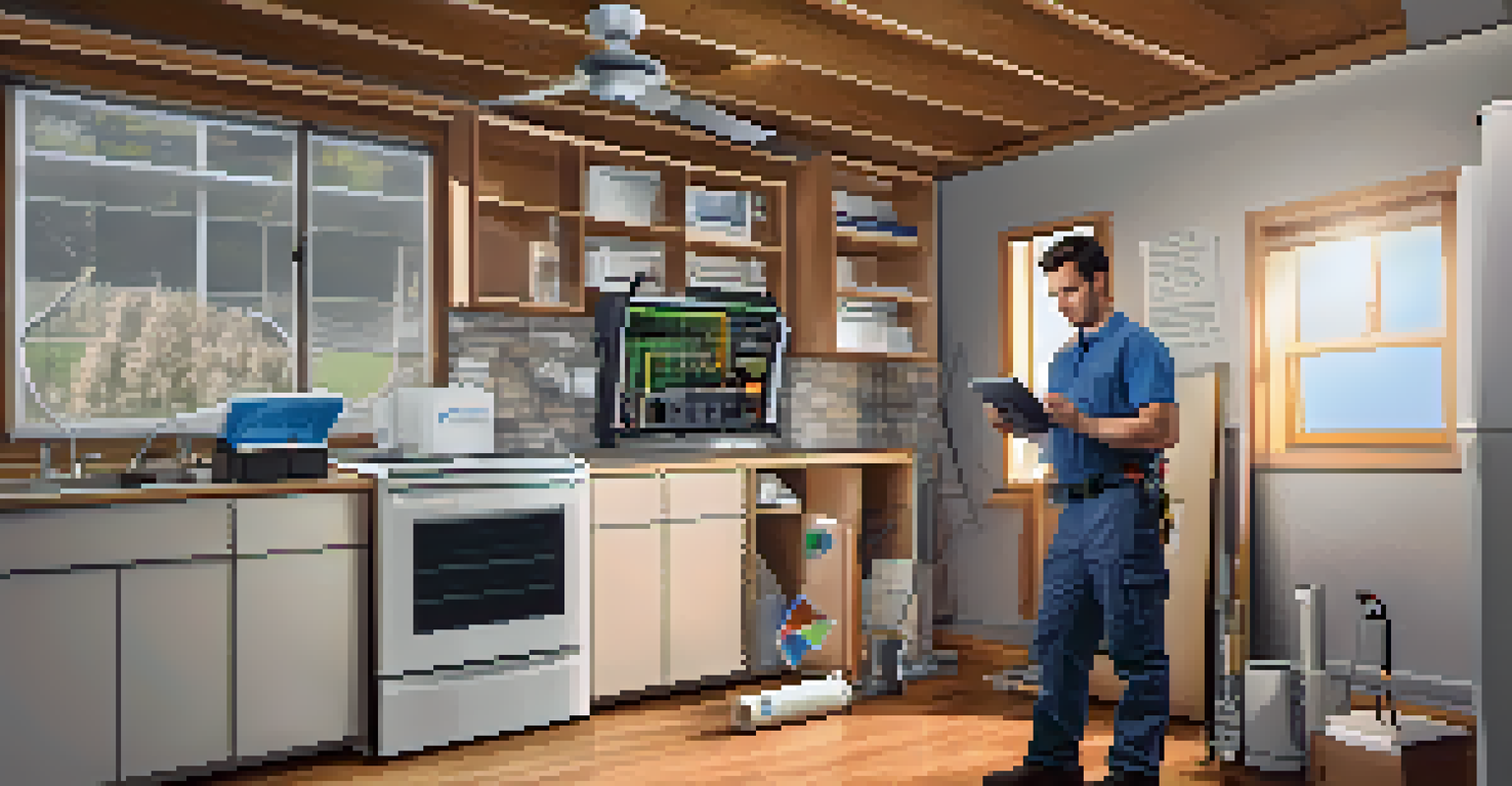How Upgrades Affect Your Home's Energy Ratings

What Are Energy Ratings and Why Do They Matter?
Energy ratings are assessments that indicate how efficiently a home uses energy. They can influence everything from your utility bills to your home's resale value. Understanding these ratings helps homeowners make informed decisions about upgrades and renovations.
The greatest threat to our planet is the belief that someone else will save it.
High energy ratings often correlate with lower energy consumption, which means reduced costs over time. When homes are more energy-efficient, they not only save money but also contribute to environmental sustainability. This makes energy ratings a crucial factor for homeowners and potential buyers alike.
In many regions, energy ratings are required for real estate transactions, making them a vital consideration when selling a home. A home with a high rating may attract more buyers, potentially leading to a quicker sale or a better price. Therefore, knowing how upgrades impact these ratings can be a game changer.
Common Home Upgrades That Boost Energy Efficiency
Upgrades like installing energy-efficient windows or adding insulation can significantly enhance a home's energy rating. For instance, double-glazed windows reduce heat loss, meaning your heating system doesn’t have to work as hard. This not only improves comfort but also lowers energy bills.

Another effective upgrade is replacing old appliances with ENERGY STAR-certified models. These appliances are designed to use less energy without sacrificing performance, which can lead to noticeable savings on your utility bills. In addition, modern heating and cooling systems often come with advanced features that optimize energy use.
Energy Ratings Impact Home Value
Understanding energy ratings is essential as they affect utility bills, resale value, and buyer interest.
Renewable energy systems, such as solar panels, can also have a profound impact on energy ratings. By generating your own electricity, you reduce reliance on the grid and lower overall energy consumption. This not only benefits your energy rating but also promotes a greener lifestyle.
How Energy Audits Assess Upgrade Needs
Energy audits are comprehensive evaluations of a home's energy use, helping identify areas for improvement. During an audit, professionals will assess insulation, HVAC systems, and even appliance efficiency. This provides homeowners with a clear picture of where upgrades could yield the most significant energy savings.
Energy efficiency is not just a cost-saving measure; it’s a way to enhance our environment and reduce our carbon footprint.
Audits typically include recommendations for specific upgrades tailored to your home's unique needs. For example, if an audit reveals that your insulation is lacking, investing in better materials could improve both comfort and efficiency. These targeted upgrades are often more cost-effective in the long run.
Moreover, many local governments offer incentives for homeowners who complete energy audits and make recommended upgrades. These programs can help offset the initial costs, making it easier to invest in energy-efficient improvements. This not only enhances your home's energy rating but also contributes to a more sustainable community.
The Role of Smart Home Technology in Energy Ratings
Smart home technology is revolutionizing how we manage energy consumption in our homes. Devices such as smart thermostats, lighting, and energy monitors allow homeowners to optimize their energy use. These technologies can adjust settings based on your habits, ensuring energy isn't wasted.
For instance, a smart thermostat can learn your schedule and adjust heating or cooling accordingly, which can lead to substantial energy savings. When homes are equipped with such technologies, they often receive better energy ratings. This is because they demonstrate a commitment to efficient energy management.
Smart Upgrades Enhance Efficiency
Upgrading to energy-efficient windows, appliances, and systems can significantly improve a home's energy rating and reduce costs.
Additionally, many smart devices can be controlled remotely, giving homeowners the flexibility to manage energy use even when they're away. This not only adds convenience but also helps maintain lower energy consumption, further enhancing the home's energy rating.
Understanding the Cost-Benefit Ratio of Upgrades
When considering upgrades, it's essential to weigh the costs against the potential benefits. While some upgrades might require a significant upfront investment, the long-term savings on energy bills can make them worthwhile. For example, while new windows can be pricey, they often pay for themselves over time through reduced heating and cooling costs.
It’s also important to consider the impact on your home's value. Energy-efficient homes are increasingly desirable in the real estate market, which means that upgrades could lead to a higher resale price. This makes energy-efficient upgrades not just a matter of saving money, but also a smart investment.
Homeowners should also investigate local incentives, such as tax credits or rebates, which can offset upgrade costs. Being informed about available programs can tip the scales in favor of making energy-efficient improvements, enhancing both your home's energy rating and your financial outlook.
The Environmental Impact of Energy-Efficient Homes
Upgrading your home to improve energy efficiency goes beyond personal benefits; it also has a positive impact on the environment. By reducing energy consumption, you help decrease greenhouse gas emissions, which is crucial for combating climate change. Each upgrade contributes to a larger movement towards sustainable living.
For example, using less energy means less demand on power plants, which often rely on fossil fuels. This shift can lead to cleaner air and a healthier planet for future generations. Many homeowners find that the environmental benefits of energy-efficient upgrades align with their values and commitment to sustainability.
Sustainability Benefits Everyone
Investing in energy-efficient upgrades not only lowers personal energy consumption but also contributes positively to the environment.
Moreover, as more homeowners make energy-efficient choices, the cumulative effect can lead to significant environmental improvements. This collective action can spark change in communities, encouraging more people to consider how their homes impact the planet. Every small upgrade adds up, making a meaningful difference.
Future Trends in Energy-Efficient Home Upgrades
The landscape of home upgrades is continually evolving, with new technologies and materials emerging regularly. Innovations like energy-efficient roofing materials and advanced insulation techniques are becoming more accessible to homeowners. Staying informed about these trends can help you make smart decisions about future upgrades.
Additionally, as energy prices fluctuate and environmental concerns grow, the demand for energy-efficient homes will likely increase. This means that investing in upgrades now could pay off even more in the future, both in terms of savings and property value. Homeowners should keep an eye on advancements that can enhance energy ratings and overall efficiency.

Finally, local and national policies are increasingly supporting energy-efficient building practices. Incentives for sustainable upgrades will likely expand, making it easier for homeowners to invest in energy efficiency. By embracing these trends, you can position your home as a leader in energy efficiency and sustainability.